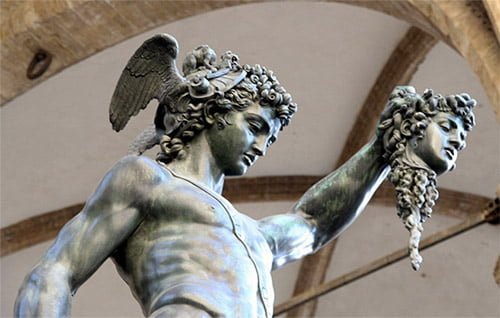Rama fires an arrow at a foe. Illustration
by Evelyn Paul (1911).
Originally published in Stories of India's
Gods and Heroes (1911). Source: Wikimedia
Commons
After winning a
fight against rakshasas, Rama was confronted with a problem that would prove
fitting of a king: the jealousies and intrigues of his subjects.
It wasn't long
after the celestial weapons had been called down to help Rama kill a band of
rakshasas, led by Subahu and Maricha, that the spear, perhaps the strongest
among them, made his concerns known. He called together a meeting between all
of the weapons. None of them were entirely sure what to make of this. They had
never had a meeting before, only having existed for several thousand years (a
thousand years seeming like mere seconds to any supernatural being).
"I'm not sure
Rama is giving us the proper credit for our bravery. We are
the ones who killed the rakshasas. Rama only aimed us where we needed to
go."
To this, the saber
replied, "But Rama is a brave and clever warrior. Surely he is doing the
work. We are, as we promised, but tools in the defeat of evil. Are you not
happy, spear, about our defeating evil? Would you rather have rakshasas running
around everywhere? Do you know how terrible this world would be?"
At this, a few of
the other weapons applauded and shouted their approval. This reception only
infuriated spear.
"I never said
that I wanted the rakshasas to run free," the spear retorted. "You've
mischaracterized my argument." A few more claps came from the crowd, these
weapons having changed their minds on the subject at hand. "Of course I'm
happy that there are fewer rakshasas. Whether we support the rakshasas' war of
independence is another matter entirely."
Few among the
weapons were in favor of such independence. Only the most radical among them
supported rakshasa self-determination and even they were reticent to voice
their support in front of so pro-Rama a crowd.
"What we are
discussing is whether Rama deserves all this praise. I believe that he is
simply the ship at sea, while we are the wind that pushes him. Without us, Rama
would go nowhere."
"Yes,"
cried the staff, "but where would the wind be without the ship? All it
would have to brush against are trees and bushes. How useless the wind would
be!"
The mace, who was
close friends with the spear, shouted, "It would scatter the seeds of
plants and help to grow forests!" The mace struggled to make itself heard
above an audience which had grown restless.
After some time,
the spear managed to gain control of the meeting again. "Let's get back on
track. When has Rama ever thanked us for saving his life? When has he ever
acknowledged how vital we are to his mission?"
The saber said,
"Why should he thank us? If anything, it is us who should be thanking him!
Without Rama, we would never achieve glory in battle. Without Rama, we could
never help create history!"
The mace whispered
to the spear, "He's right, spear. Without Rama, we couldn't even consider
ourselves true warriors."
The spear
reluctantly agreed. He knew that, if it weren't for Rama, nothing would have
happened. They would never have become part of the Ramayana, an epic of which
Brahma had recently told them.
The spear turned
to the crowd and said grudgingly, "This is true. We need Rama."
The weapons sent
an envoy, the mace, to earth. There, it spoke to Rama.
"Blessed
Rama, we wish to thank you for helping us achieve glory in both worlds. You are
a courageous fighter and we are proud of having helped slain so many
rakshasas."
Rama, courteous
and honest as ever, replied, "I could not have won without you, my strong
celestial weapons. We have all played a vital role in defeating the horde of
rakshasas. Just as a flower cannot live without the bee, I cannot win without
these weapons."
The envoy returned
to the celestial weapons and told them what Rama had said. The weapons rejoiced
in the knowledge that, not only had they played an essential role in the
battle, but that Rama, prince and future king, had praised them so highly. They
expected much good to come of this partnership.
Author's Note
The weapons, when
called down by Vishwamitra, proclaim loyalty to Rama and pledge to help him
whenever he needs them. Given this pledge of loyalty, it seems likely that the
weapons have some thoughts of their own. I thought that it would be interesting
to show some characters who, rather than simply adoring Rama or fervently
hating, hold mixed feelings concerning him. It seems only natural that at least
one of those beings (be it a man or a celestial sword) would be jealous or feel
as though they weren't given enough credit. It's clear that the epic centers
around Rama's exploits. By writing from the perspective of the celestial
weapons, I've provided, not exactly a backstory, but an elaboration of those
events surrounding Rama during his adventures. The reference to the rakshasas' war of independence suggests a more complex supernatural history. They are more than just evil demons.
Bibliography
Various authors. Ramayana (public domain). Source.









